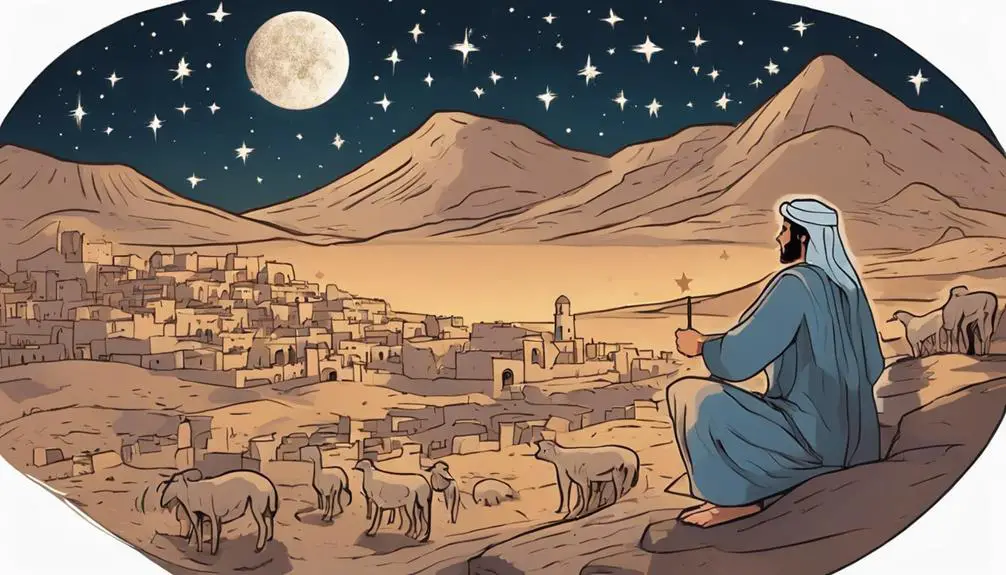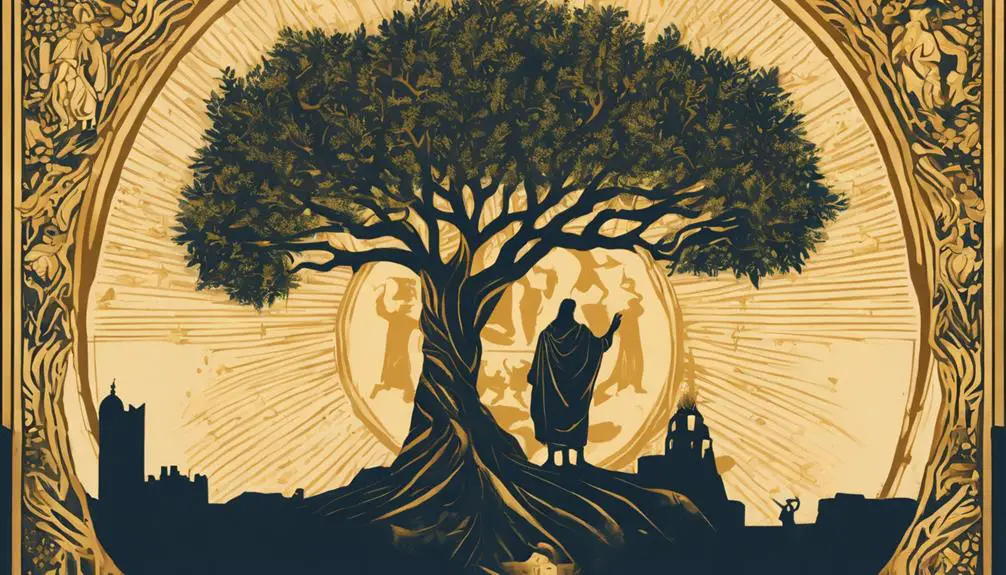The biblical concept of legacy delves into how faith, wisdom, and actions shape generations, uncover what ancient lessons mean for us today.

Define Legacy in the Bible
As you scroll through the digital archives of history, it's intriguing to consider how the Bible addresses the concept of legacy. You might ponder the lasting impacts of figures like Abraham, whose faith set a cornerstone for generations, or Solomon, whose wisdom and wealth have been subjects of discussion for millennia.
These narratives aren't just ancient history; they offer insights into the values and virtues that have been passed down through the ages. Now, as you're poised at the edge of this exploration, consider what lessons these legacies might hold for you and the world today.
Key Takeaways
- Legacy in the Bible encompasses divine covenants, leadership, and moral guidance from figures like Abraham, Moses, David, and Solomon.
- It involves the transmission of faith, values, and divine promises across generations, ensuring community continuity and identity.
- Biblical legacies include the establishment of laws, demonstration of divine favor, and achievements that solidify spiritual heritage and collective memory.
- Lineage and messianic connections highlight the importance of descent and prophecy in understanding one's role and contribution to religious narratives.
The Legacy of Abraham

Throughout history, Abraham's legacy has profoundly shaped the foundational narratives of Judaism, Christianity, and Islam, underscoring his pivotal role as a patriarch in these monotheistic faiths. Central to his legacy are the covenant promises made by God, which not only established him as a key figure but also set the stage for the unfolding of significant religious narratives that have influenced billions. You'll find that these promises extend beyond the mere establishment of a nation through his progeny; they encapsulate moral obligations and a relationship with the divine that's both personal and communal.
Moreover, Ishmael's lineage, often emphasized in Islamic tradition, underscores the breadth of Abraham's impact. This aspect of his legacy highlights the inclusivity and diversity inherent in his story, as it portrays a patriarch whose descendants would come to establish major world religions. The narrative around Ishmael's lineage not only enriches the understanding of Abraham's significance but also fosters a sense of interconnectedness among the faiths that regard him as a foundational figure.
In analyzing Abraham's legacy, it's clear that his life and the covenant promises associated with him represent a cornerstone in the spiritual heritage of Judaism, Christianity, and Islam, offering a rich tapestry of faith, family, and divine promise that continues to resonate today.
Moses: Leadership and Legacy
Just as Abraham's legacy has been foundational for monotheistic religions, Moses' leadership and legacy have been pivotal in shaping the laws, moral codes, and communal identity of the Jewish people. Moses' journey from the bulrushes of the Nile to the heights of Mount Sinai encapsulates a narrative rich with divine encounters, legislative milestones, and the forging of a covenant that has endured through the ages.
Moses' leadership is marked by several key moments:
- The Exodus: Leading the Israelites out of Egyptian bondage, showcasing resilience against oppression.
- Mount Sinai: Receiving the Ten Commandments, which have become universal moral directives.
- Plague Consequences: Navigating the challenges and judgments from God, demonstrating the importance of obedience and faith.
- The Wilderness: Guiding the Israelites through 40 years of wandering, teaching lessons in trust and provision.
Through these actions, Moses not only liberated his people but also laid the foundational ethos for Jewish law and ethics. His encounters at Mount Sinai, in particular, underscored the covenantal relationship between God and His people, embedding a legacy of faith, law, and identity that resonates to this day.
David's Royal Heritage

Shifting focus to another monumental figure, King David's royal heritage established a dynasty that profoundly influenced the religious and political landscape of the Jewish nation. His journey from a shepherd boy to the king of Israel is marked by pivotal moments, notably the Goliath battle. This victory wasn't just a display of courage; it was a cornerstone in David's path to kingship, showcasing divine favor and a leader's heart.
David's ascent, however, wasn't seamless. Saul's jealousy, sparked by David's growing popularity and God's favor, underscores a significant period of turmoil and transition. This tension between David and Saul reflects the complexities within God's chosen leadership and the human response to divine selection and favor. It's within this context that David's royal heritage takes on a deeper significance. His lineage, marked by divine promise and covenant, becomes a central theme in understanding the Messiah's prophesied descent from David's line.
This heritage isn't just about royal bloodline; it's about the legacy of faith, leadership, and God's covenant with His people. David's dynasty, therefore, stands as a testament to God's enduring promise and the intricate ways through which divine plans unfold in human history.
Solomon's Wisdom and Wealth
Solomon's ascent to the throne ushered in an era distinguished by unprecedented wisdom and wealth, reflecting the fulfillment of divine promises made to his father, King David. His reign is marked by strategic alliances and monumental achievements, most notably the construction of the Temple in Jerusalem. Solomon's wisdom, granted by God in response to his humble request, not only brought peace and prosperity to Israel but also attracted international attention and admiration.
Consider these pivotal aspects of Solomon's reign:
- Solomon's alliances with neighboring kingdoms through marriage and treaties significantly expanded Israel's influence and brought economic prosperity.
- The construction of the Temple served as a physical manifestation of Israel's religious devotion and a center for worship, solidifying Jerusalem's status as a holy city.
- Solomon's judicial wisdom, as demonstrated in the famous case of the two mothers, established his reputation for fairness and divine insight.
- His wealth, accumulated through trade, taxation, and tributes, set a standard for royal opulence in Israel's history.
Solomon's legacy, encapsulated by his wisdom and wealth, underscores the intricate relationship between divine favor, political acumen, and personal virtue in achieving and maintaining power and prosperity.
Generational Faith in the New Testament

In the New Testament, generational faith emerges as a cornerstone concept, illustrating how beliefs and values transcend individual lifetimes to shape community identity and spiritual continuity. This concept is meticulously woven through the narratives and letters, highlighting the importance of faithful perseverance and adherence to Apostolic teachings. You'll find that the early Christian communities placed significant emphasis on transmitting faith from one generation to the next, ensuring that the core tenets of Christianity weren't just preserved but flourished.
Through the lens of generational faith, you'll observe how figures like Paul, in his epistles, advocate for a faith that withstands trials and tribulations, underscoring the necessity of steadfastness. This isn't merely about individual salvation but about nurturing a collective legacy of belief, bound by the teachings of the Apostles. The New Testament, therefore, serves as both a record and a roadmap for how generational faith can sustain and expand a spiritual community, ensuring that the foundational truths of the faith are imparted to successive generations.
This approach not only preserves the integrity of Christian teachings but also fosters a sense of belonging and identity among believers, linking them across time through shared values and a mutual commitment to faithful perseverance.
Frequently Asked Questions
How Does the Concept of Legacy in the Bible Differ From Secular Understandings of the Term?
In the Bible, legacy isn't just about generational wealth or cultural interpretations. It's deeply rooted in spiritual inheritance and moral teachings passed down through generations.
Unlike secular views that often focus on material wealth and fame, the biblical perspective emphasizes living a life that honors God, impacting future generations through faith and righteousness.
This distinction highlights a broader, more profound understanding of legacy, intertwining material and spiritual dimensions.
Can an Individual's Sins or Virtues Directly Impact Their Descendants' Legacies According to Biblical Teachings?
Imagine your great-grandfather was a revered community leader. His virtues, like kindness and justice, aren't just family lore; they're your ancestral blessings. According to biblical teachings, yes, an individual's sins or virtues can indeed impact their descendants' legacies.
This concept is evident through the ideas of generational curses and ancestral blessings. Analyzing these, it's clear that your forebears' moral and spiritual choices can echo through generations, influencing your own legacy.
In What Ways Does the Bible Address the Concept of Legacy for Those Without Biological Descendants?
You'll find the Bible addresses legacy through concepts like spiritual adoption and faithful stewardship. It suggests your legacy isn't just about biological descendants. Instead, it emphasizes how your faith and actions can create a lasting impact, extending beyond familial ties.
How Do New Testament Teachings Reconcile the Idea of a Personal Legacy With the Emphasis on Humility and Servitude?
Navigating the New Testament's teachings is like sailing through a sea where the waves of service paradox and humble leadership guide you.
These texts intricately weave the notion that true greatness lies not in towering achievements, but in the quiet strength of serving others.
It's a realm where humility and servitude aren't just virtues but the very core of personal legacy, challenging you to leave a mark through acts of kindness and selfless leadership.
What Practical Steps Does the Bible Suggest for Believers Who Wish to Leave a Spiritual Legacy That Aligns With Biblical Values?
You're looking to leave a spiritual legacy in line with biblical values. Start by embracing spiritual disciplines like prayer, meditation, and studying scripture. These practices deepen your faith and understanding, guiding your actions and decisions.
Additionally, charitable giving is emphasized as a tangible way to reflect God's love and generosity. By integrating these elements into your life, you're actively participating in creating a legacy that honors biblical principles and impacts others positively.
Conclusion
In the tapestry of biblical narratives, you're a thread intertwined with the legacies of Abraham, Moses, David, and Solomon, each embodying leadership, faith, and wisdom.
Like a tree planted by streams of water, your roots delve into these ancestral soils, drawing nourishment from their stories.
The New Testament's generational faith isn't just a historical recount; it's your mirror reflecting a lineage of spiritual inheritance.
Thus, your life becomes an allegory, a living testament to these enduring legacies, inviting deep, scholarly reflection.



Sign up